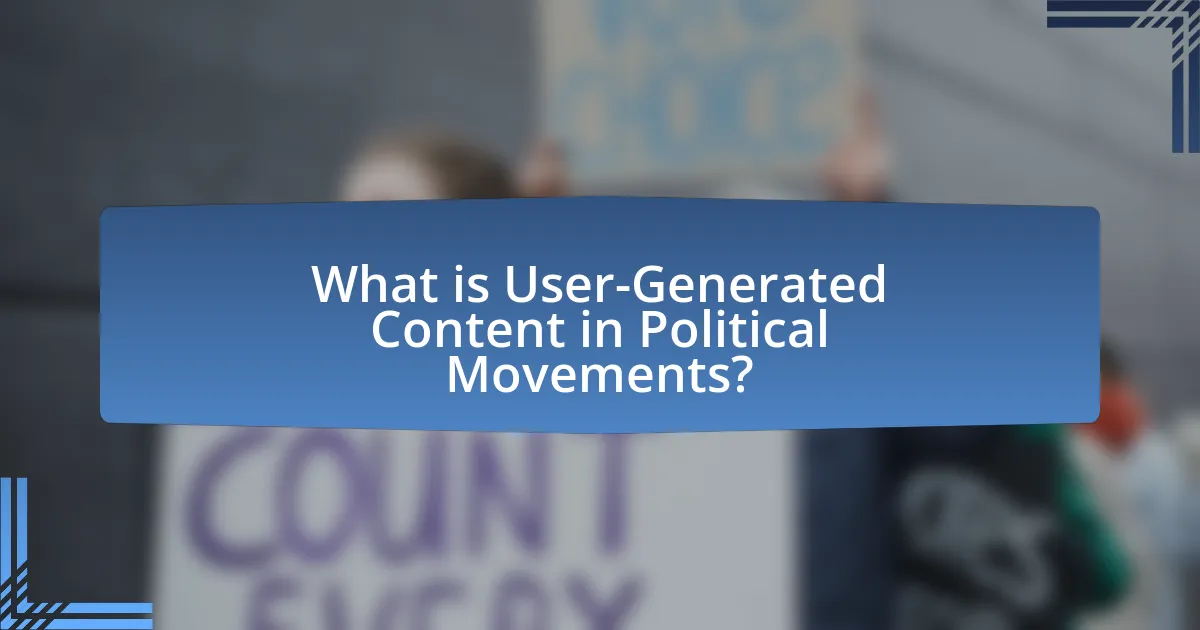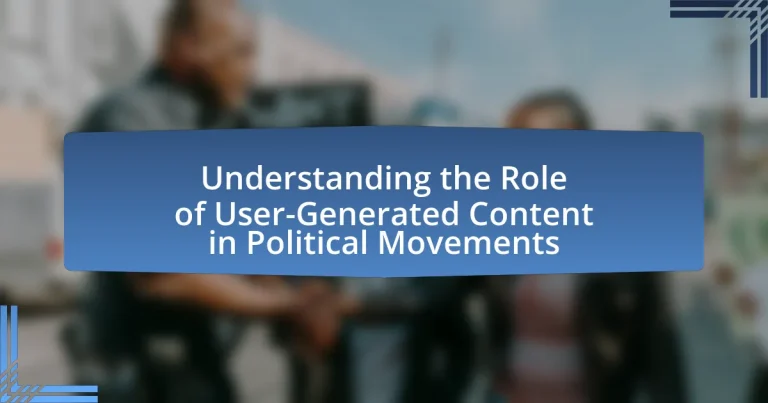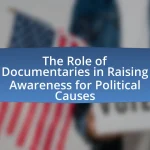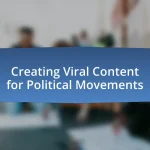User-Generated Content (UGC) plays a pivotal role in political movements by enabling individuals to create and share content that shapes public discourse and mobilizes support. This article explores the influence of UGC on political engagement, highlighting its prevalence in forms such as social media posts, videos, and blogs. It examines how UGC impacts public opinion, enhances grassroots movements, and interacts with traditional media, while also addressing challenges such as misinformation and censorship. Additionally, the article discusses ethical considerations and strategies for activists to effectively leverage UGC in their campaigns.

What is User-Generated Content in Political Movements?
User-Generated Content (UGC) in political movements refers to any content created and shared by individuals rather than traditional media outlets, which plays a crucial role in shaping public discourse and mobilizing support. UGC includes social media posts, videos, blogs, and images that reflect personal experiences, opinions, and calls to action related to political issues. For instance, during the Arab Spring, platforms like Twitter and Facebook facilitated the dissemination of grassroots narratives, enabling citizens to share real-time updates and organize protests, thereby influencing global awareness and engagement. This phenomenon underscores the power of individual voices in amplifying political messages and fostering community solidarity.
How does User-Generated Content influence political discourse?
User-Generated Content (UGC) significantly influences political discourse by enabling individuals to share their perspectives and mobilize communities. This democratization of information allows for diverse viewpoints to emerge, often challenging traditional media narratives. For instance, during the Arab Spring, social media platforms facilitated the rapid dissemination of grassroots content, which played a crucial role in organizing protests and shaping public opinion. Research by the Pew Research Center indicates that 64% of Americans believe social media has a major impact on political engagement, highlighting UGC’s role in fostering political participation and dialogue.
What types of User-Generated Content are most prevalent in political movements?
The most prevalent types of User-Generated Content (UGC) in political movements include social media posts, videos, memes, blogs, and online petitions. Social media posts, particularly on platforms like Twitter and Facebook, serve as a primary means for individuals to express opinions, share news, and mobilize support. Videos, often shared on platforms like YouTube and TikTok, provide visual narratives that can effectively convey messages and rally supporters. Memes are widely used for their ability to simplify complex political issues into relatable and shareable content, enhancing engagement. Blogs allow for in-depth discussions and personal reflections on political topics, while online petitions facilitate collective action by gathering signatures to demonstrate support for specific causes. These forms of UGC have been instrumental in movements such as the Arab Spring and Black Lives Matter, showcasing their impact on public discourse and activism.
How does User-Generated Content shape public opinion during political events?
User-Generated Content (UGC) significantly shapes public opinion during political events by providing diverse perspectives and facilitating real-time engagement. UGC, such as social media posts, videos, and blogs, allows individuals to share their views and experiences, which can influence the perceptions of others. For instance, during the Arab Spring, platforms like Twitter and Facebook enabled citizens to document protests and share information, leading to increased global awareness and support for the movements. Research by the Pew Research Center indicates that 64% of Americans believe social media has a major impact on political opinions, highlighting the role of UGC in shaping discourse. This democratization of information allows for a broader range of voices to be heard, often challenging traditional media narratives and mobilizing public sentiment.
Why is User-Generated Content important for political activism?
User-Generated Content (UGC) is important for political activism because it amplifies diverse voices and fosters grassroots engagement. UGC allows individuals to share their perspectives, experiences, and mobilize support, which can lead to increased awareness and participation in political issues. For instance, during the Arab Spring, social media platforms were flooded with user-generated videos and posts that documented protests and human rights abuses, significantly influencing global attention and support for the movements. This demonstrates that UGC not only democratizes information dissemination but also empowers communities to organize and advocate for change effectively.
What role does User-Generated Content play in mobilizing supporters?
User-Generated Content (UGC) plays a crucial role in mobilizing supporters by fostering community engagement and amplifying messages. UGC allows individuals to share their personal experiences and perspectives, which can resonate more deeply with potential supporters than traditional messaging. For instance, during the Arab Spring, social media platforms were flooded with user-generated videos and posts that documented protests and human rights abuses, effectively rallying global attention and support. This grassroots content not only informs but also inspires action, as supporters feel a personal connection to the cause through shared narratives.
How does User-Generated Content enhance grassroots movements?
User-Generated Content (UGC) enhances grassroots movements by amplifying voices and fostering community engagement. UGC allows individuals to share their experiences, opinions, and mobilization efforts, creating a sense of belonging and collective action. For instance, during the Black Lives Matter movement, social media platforms were flooded with user-generated posts, videos, and hashtags that raised awareness and mobilized protests globally. This organic spread of information not only informed participants but also attracted new supporters, demonstrating the power of grassroots mobilization through shared narratives and real-time updates.
What challenges does User-Generated Content face in political contexts?
User-Generated Content (UGC) in political contexts faces challenges such as misinformation, lack of credibility, and regulatory scrutiny. Misinformation can spread rapidly through UGC, leading to public confusion and manipulation, as seen during elections where false narratives can influence voter behavior. The credibility of UGC is often questioned, as it lacks the editorial oversight typical of traditional media, making it difficult for audiences to discern reliable information. Additionally, regulatory scrutiny has increased, with governments implementing policies to monitor and control online content, which can stifle free expression and limit the reach of grassroots political movements. These challenges highlight the complexities of utilizing UGC effectively in political discourse.
How do misinformation and disinformation affect User-Generated Content?
Misinformation and disinformation significantly undermine the credibility and reliability of User-Generated Content (UGC). When false information is disseminated, it can lead to the spread of misleading narratives that distort public perception and influence political opinions. For instance, a study by the Pew Research Center found that 64% of Americans believe that misinformation has caused confusion about basic facts regarding political issues. This confusion can result in users sharing content that perpetuates falsehoods, thereby amplifying the impact of misinformation and disinformation within political movements. Consequently, the integrity of UGC is compromised, making it challenging for audiences to discern factual information from fabricated content.
What are the implications of censorship on User-Generated Content in politics?
Censorship significantly restricts User-Generated Content (UGC) in politics, limiting the diversity of voices and perspectives in political discourse. This suppression can lead to a homogenization of information, where only state-sanctioned narratives are amplified, undermining democratic processes. For instance, during the Arab Spring, governments attempted to censor social media platforms to control the flow of information, which ultimately fueled public dissent and mobilization against authoritarian regimes. Studies show that censorship can also drive UGC underground, pushing dissenting voices to less visible platforms, which may hinder broader public engagement and awareness. Thus, the implications of censorship on UGC in politics include reduced political pluralism, increased polarization, and the potential for social unrest as marginalized voices seek alternative means of expression.
How does User-Generated Content interact with traditional media?
User-Generated Content (UGC) interacts with traditional media by serving as a complementary source of information and engagement that influences public discourse. Traditional media outlets often incorporate UGC, such as social media posts, videos, and blogs, to enhance their storytelling and provide diverse perspectives, particularly during political movements. For instance, during the Arab Spring, traditional news organizations utilized content from platforms like Twitter and Facebook to report on events in real-time, showcasing the power of citizen journalism. This integration not only enriches the narrative but also fosters a more participatory media landscape, where audiences contribute to and shape the news cycle.
What are the ethical considerations surrounding User-Generated Content in political movements?
The ethical considerations surrounding User-Generated Content (UGC) in political movements include issues of misinformation, consent, and accountability. Misinformation can spread rapidly through UGC, leading to public confusion and potentially harmful consequences, as seen during events like the 2016 U.S. presidential election where false narratives influenced voter perceptions. Consent is another critical factor, as individuals may not be aware that their content is being used in a political context, raising questions about privacy and exploitation. Additionally, accountability becomes complex when UGC is shared widely; it can be challenging to trace the origin of content and hold individuals or organizations responsible for its impact. These considerations highlight the need for ethical guidelines and frameworks to navigate the complexities of UGC in political discourse.
What strategies can activists use to effectively leverage User-Generated Content?
Activists can effectively leverage User-Generated Content (UGC) by encouraging community participation, utilizing social media platforms, and creating compelling narratives. Community participation can be fostered through campaigns that invite individuals to share their stories, experiences, or opinions related to the cause, which enhances engagement and builds a sense of ownership among supporters. Social media platforms serve as powerful tools for disseminating UGC, allowing activists to amplify voices and reach wider audiences; for instance, hashtags can be used to aggregate content and create a unified message. Compelling narratives can be crafted by curating UGC that resonates emotionally with the audience, thereby increasing the likelihood of sharing and further engagement. Research indicates that campaigns utilizing UGC can increase engagement rates by up to 28% compared to traditional content, demonstrating the effectiveness of these strategies in mobilizing support for political movements.
How can User-Generated Content be used to create impactful narratives?
User-Generated Content (UGC) can be used to create impactful narratives by amplifying diverse voices and personal experiences that resonate with audiences. This content often reflects authentic perspectives, fostering emotional connections and engagement. For instance, during political movements, UGC such as social media posts, videos, and blogs can illustrate grassroots sentiments and mobilize support, as seen in the Arab Spring where citizen journalism played a crucial role in shaping public discourse. Research indicates that narratives built on UGC can enhance relatability and trust, making messages more persuasive and effective in influencing public opinion and driving action.
What best practices should be followed when encouraging User-Generated Content?
To effectively encourage User-Generated Content (UGC), organizations should prioritize clear guidelines and incentives for participation. Establishing specific themes or topics can guide users in creating relevant content, while offering rewards or recognition can motivate contributions. Research indicates that campaigns with defined objectives and user engagement strategies see a 30% increase in participation rates, as evidenced by a study from the Content Marketing Institute. Additionally, fostering a community atmosphere through interaction and feedback enhances user involvement, leading to a richer pool of content.


